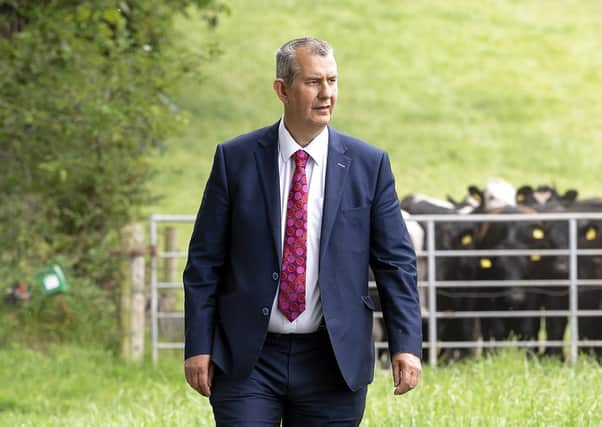DUP environment minister Edwin Poots accused of ‘blocking climate change act’


Edwin Poots faced demands to act as the Assembly passed a motion calling for the introduction of a Climate Change Act, with binding carbon reduction targets, within three months.
During the debate on the motion, Mr Poots said it was “ridiculous” to call for a comprehensive piece of legislation to be developed in just three months.
Advertisement
Hide AdAdvertisement
Hide AdThe minister insisted he would not be found wanting when it came to action to protect the environment but he made clear he did not favour the introduction of a raft of new “waste of time regulations”.
He rejected the terms “emergency” or “crisis” when it came to the climate change issue and argued that time was needed to properly assess the scientific evidence.
Sinn Fein MLA Philip McGuigan, who tabled the motion, said the Assembly debate had demonstrated an “overwhelming and urgent desire” among MLAs for a Climate Change Act.
“We are living through a climate emergency, with disastrous effects on the natural world, biodiversity, our society, and our economy,” he said.
“We need a legally-binding Climate Change Act.
Advertisement
Hide AdAdvertisement
Hide Ad“Warm words have not been good enough, and the North remains a laggard on climate action.
“Future generations will look back at this period of denial and delay with anger.
“The science could not be clearer about the stark and immediate threat of climate breakdown, yet still the minister delays.
“Minister Poots must end the delay, heed the clear call of the Assembly today and introduce a Climate Change Act within three months.”
Mr Poots branded the timeframe unrealistic.
Advertisement
Hide AdAdvertisement
Hide Ad“A three-month timeframe is impossible to achieve, it is ridiculous to ask for it,” he said.
In comments clearly directed at Sinn Fein members, he added: “What I hear from a lot of the members that have come forward here today is words.
“They want me to do something in three months having delayed this Assembly actually doing anything for three years.”
He added: “I’m not a politician who gets too hung up about motions and about regulations and all of that.
Advertisement
Hide AdAdvertisement
Hide Ad“I want to see actions and things which will make tangible differences here in Northern Ireland and beyond.”
Mr Poots said there were strong conditions for the executive to reinforce “climate positive behaviours” that have increased during lockdown, such as home working.
He also warned that he would not introduce any laws that had a detrimental impact on the farming community.
“I don’t support the motion, I can’t support the motion,” said the minister.
Advertisement
Hide AdAdvertisement
Hide Ad“We shouldn’t be using language such as emergency or crisis.
“Northern Ireland climate change legislation shouldn’t be rushed through and forced upon the Assembly without it being properly informed and considered.
“We need greater clarity and evidence on what should go into legislation and what that can deliver for Northern Ireland and, without this, we have a real risk of rushing through something which we later find out has a detrimental effect and puts up barriers for businesses and industry, debilitating Northern Ireland’s realisation of a just transition to a low carbon green economy.”
John Martin, head of policy and advocacy at wildlife charity RSPB NI, said a Northern Ireland Climate Change Act would introduce the vital legislation that is needed to ensure it keeps pace with the rest of the UK and Ireland by setting legally binding targets to reduce carbon emissions.
Advertisement
Hide AdAdvertisement
Hide Ad“The impact of having no climate change legislation in Northern Ireland is already evident through the considerable disparity in emission reduction progress between Northern Ireland and the rest of the UK.
“This gap will only increase if further delays to legislate ensue and presents a greater risk to public health and the economy.”